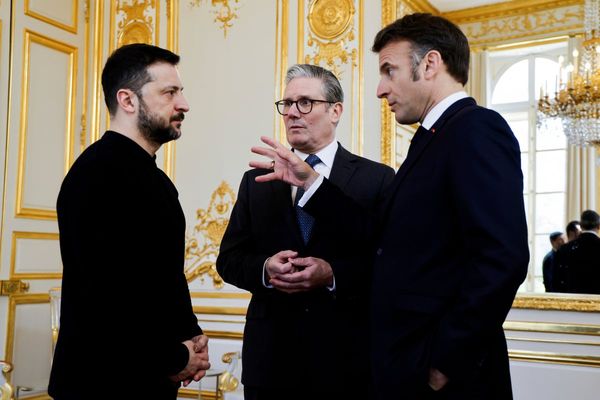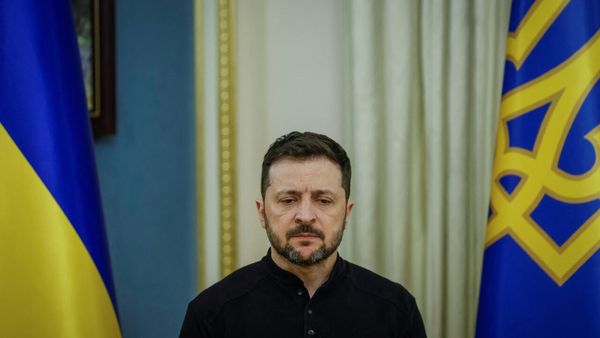
If I look out of the window as I’m writing this, I can see the grand, stuccoed Russian embassy in London, which some years ago mounted a large screen on the wall outside, on which it likes to broadcast its frequently obnoxious Twitter feed to passersby. If I look at the television screen in the room in which I’m sitting, I can see a despairing Ukrainian woman throwing her broken windows from her apartment building in the aftermath of a shelling. So yes: it was the best of times, it was the worst of times.
This afternoon, when I walk down to the opticians, I will pass some large, unconvincingly spontaneous graffiti that recently appeared on someone else’s wall. It reads: “There is no Russian interference in elections.” (Kids, eh?) Next, I will pass two vast houses that I know to be owned by oligarchs – one of whom is Roman Abramovich – and two others that are heavily rumoured to be. Some of these properties are on a street that also hosts various ambassadorial residences, and they are therefore protected obligingly around the clock by multiple armed British police officers.
Just a tiny snapshot from a London that is uniquely placed to hurt Russia’s richest and most powerful – the class who could ultimately help decide how long Vladimir Putin sticks around. Yet London continues to pull its punches. In a mirthless sort of way, I enjoyed Boris Johnson thundering on Thursday that “oligarchs in London will have nowhere to hide”. Righto. That same morning, Andrey Guryev, the reported owner of Witanhurst, London’s second largest house after Buckingham Palace, could be seen on telly at Putin’s meeting of the oligarchs in the Kremlin. Not a great hiding place – but then, perhaps Andrey knows the seeker is so quarter-arsed he doesn’t actually need one. London’s fight against oligarchs reminds me a lot of Russia’s fight against doping in sports. Some real through-the-looking-glass stuff.
Anyway, I say that Guryev is the “reported owner” of Witanhurst, because even that simple fact remains extraordinarily difficult to establish, to say nothing of more controversial information. For so many of these Russian persons of interest, the internet management alone is a full-time job. But then, there are so very many full-timers. In a few weeks you will be able to buy the brilliant Oliver Bullough’s new book, Butler to the World, in which he details how the UK became the servant of some of the world’s worst individuals. To help the oligarchs, the kleptocrats and the gangsters, Londongrad boasts a whole humming, interconnected professional class of reality-launderers specifically designed to service them – lawyers and lobbyists and education consultants and all sorts of others who imagine themselves to work for respectable businesses. But don’t.
I thought of them when I read an article by Marta Shokalo, editor of the BBC’s Ukrainian service, written in the hours after the invasion began on Thursday. She described hearing the explosions in Kyiv and, later, getting her 10-year-old son up and dressed. “We had some breakfast, sitting as far from the windows as we could,” she wrote, “but he was so scared he vomited.” Reading this yesterday before supper with my own children I felt such a deep, painful sympathy for her. There is no one working to launder reality for her child. There is no army of sharp-suited professionals lavishing painstaking hours on making all the bad stuff go away for Ukrainian children, two of whom were reportedly killed in the past 24 hours by Russian strikes on civilian targets. It is their misfortune – their tragedy – to live at the sharp end of Vladimir Putin’s wickedness, while the megarich who exist in grotesque symbiosis with the Russian president have their every rough edge smoothed off in this capital they most adore to call home. Or, as Bullough now asks: “Why are we preferring Russian oligarchs over Ukrainian kids?”
Why indeed? I don’t want to go out on a limb here, but Britain’s professed attempt to deter Putin with sanctions was arguably hindered by not imposing any even remotely irksome sanctions until after he’d actually invaded Ukraine. Less “stop or we’ll shoot”, more “shoot or we’ll stop”. For so long now, the urgency and gravitas that successive governments have brought to this problem are epitomised by Gavin Williamson’s comment that “Russia should go away and should shut up”.
That, you might recall, came in the wake of Putin deploying a nerve agent on our soil. Even now, just typing those words is a proper mindmelt. Not one month before, the wife of Putin’s former deputy finance minister had successfully bid £30,000 at a Tory party fundraiser to have dinner with Williamson at the Churchill war rooms. Indeed, this same woman, Lubov Chernukhin, has spent a fortune buying time with politicians, including £160,000 to play tennis with David Cameron and Boris Johnson. The year after Salisbury, she paid £135,000 for “a night out with Theresa May”. (I know, I know – second prize was two nights out with Theresa May.) We’ve even seen a picture of this soiree, thanks to trigger-happy Instagrammer Liz Truss, who came along for the fun, along with several other senior Tory women. The future foreign secretary genuinely captioned the picture: “And it’s ladies night #cabinetandfriends #girlpower.” As one fellow attender fumed of Truss, she’d “dropped them in it for the sake of a few likes”.
Which sounds like the words of someone who’d prefer that their money-grubbing and influence-peddling happened in secret. In Londongrad, of course, they would be in positively multitudinous company. As Putin closes in physically on Ukraine’s capital, our own capital has yet to properly instigate a reckoning with itself. Instead, the people with power to hit his cronies where it hurts still prefer to just shut up and go away.
Marina Hyde is a Guardian columnist
An evening with Marina Hyde and John Crace Join Marina Hyde and John Crace for a look back at the latest events in Westminster on Monday, 7 March, at 8pm GMT | 9pm CET | 12pm PST | 3pm EST. Book tickets here







